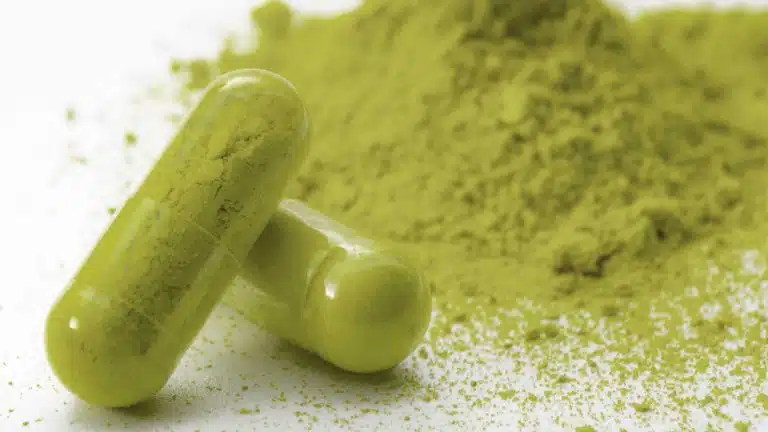Kratom | Abuse Potential, Uses, Effects, & Treatment
- Kratom Abuse Potential
- How Is Kratom Used?
- Effects Of Kratom Abuse
- Treatment For Kratom Abuse & Addiction
- FAQ

Kratom is the shortened name for the mitragyna speciosa tree that grows in Southeast Asia. Its leaves have stimulant and opioid-like effects when ingested. Kratom products are sold around the world as whole kratom leaves, as pills, and as an active ingredient in some dietary supplements.
Kratom Abuse Potential
Kratom is currently not a controlled substance in the United States. However, kratom can still be habit-forming. Its abuse potential is unknown, but taking it does have risks.
Some people see kratom products as an alternative to prescription opioids. They may cite the low numbers of overdose deaths involving kratom or the comparatively high numbers of abuse for legal opioids.
However, advocates for kratom tend to agree more research needs to be done on this plant.
How Is Kratom Used?
In Southeastern Asian countries like Thailand or Indonesia, kratom leaves have historically been chewed or brewed into tea. Low doses of kratom can increase energy and reduce fatigue. High doses may be used for pain relief and mental health problems, such as anxiety.
Some people also take kratom to deal with opioid addiction. One study reported that 35% of people who took kratom for opioid withdrawal symptoms had not taken prescription or illicit opioids (such as fentanyl or heroin) for more than a year.
Despite these uses, kratom is not approved for any form of medical use in the United States.
Effects Of Kratom Abuse
Kratom has different effects depending on the amount taken. Low doses of kratom can have stimulant-like effects, while high doses can have depressant-like effects.
Both types of effects have abuse potential. Stimulant effects might be sought after to increase energy or productivity, while depressant-like effects can be used to get “high.”
Side effects of kratom vary widely, and may include:
- sedation
- drowsiness
- loss of appetite
- constipation
- nausea
- sweating
- increased aggression
- dry mouth
- increased urination
Addiction
Mitragynine and 7-hydroxymitragynine, the main compounds in kratom leaves, affect the same opioid receptors as prescription opioids. Just as opioids can be habit-forming, so can kratom, since they affect the brain in similar ways.
Since kratom and opioids affect the same receptors in the brain, this may be why some people have found kratom effective in fighting opioid addiction. However, kratom itself can be habit-forming, which may only continue the pattern of drug abuse and addiction.
Dependence
One study showed that people who took kratom for more than six months were more likely to experience withdrawal symptoms. Kratom also has similar health effects to other opioids and stimulants during long-term use, including tolerance and addictive behaviors.
Some long-term effects of kratom, like psychosis, hallucinations, seizures, and weight loss may be more commonly seen in people who consistently take the drug.
Withdrawal symptoms of kratom can include insomnia, runny nose, changes in mood, and hostility.
Overdose
One source reports there were 11 kratom-related deaths in the U.S. from 2011 to 2017. Nine of these deaths involved other substances, like alcohol and cocaine. These numbers suggest it can be difficult to overdose on pure kratom, even in higher doses.
High numbers of opioid overdose deaths are at the center of the opioid epidemic in the United States. The low number of case reports involving people who passed away after taking kratom is much lower than people taking prescription opioids.
There are not many studies on the use of kratom when combined with other substances. The interaction of kratom and other substances is still largely unknown.
Salmonella & Kratom Exposure
Kratom abuse and addiction can affect a person’s family members and loved ones too. Like prescription opioids, kratom can end up in a nursing mother’s breast milk. The kratom can be ingested by the infant, who may experience symptoms of withdrawal and dependence on kratom.
In 2018, there was a multistate outbreak of salmonella that was traced back to kratom products.
Nearly 200 people were exposed to and infected with salmonella, and many were hospitalized. Unregulated kratom products can increase the risk of foreign substances getting into the final product.
Treatment For Kratom Abuse & Addiction
Official stances on kratom use are still being debated. Some experts are calling for its ban, while others insist more research is needed to come to a surer conclusion about the drug policy on kratom.
Since little research has been done on kratom, effective treatments for kratom abuse and addiction are still unknown. Treatments may be similar ones seen in opioid addiction programs, such as behavioral therapy and medication-assisted treatment.
If you believe a drug abuse treatment program is right for you or a loved one, contact our helpline today.
FAQ
Can You Snort Kratom?
Kratom leaves can be crushed into a fine powder and snorted. When snorted in small doses, kratom may create stimulant-like effects. Snorting kratom in large amounts can lead to intense sedation that’s similar to the effects of opioid drugs.
Learn more about Snorting Kratom
Written by Ark Behavioral Health Editorial Team
©2024 Ark National Holdings, LLC. | All Rights Reserved.
This page does not provide medical advice.
Centers for Disease Control and Prevention - Multistate Outbreak of Salmonella Infections Linked to Kratom (Final Update)
Drug Enforcement Administration - Drug Fact Sheet: Kratom
Food and Drug Administration - FDA and Kratom
John Hopkins Medicine - Natural Herb Kratom May Have Therapeutic Effects And Relatively Low Potential For Abuse Or Harm, According To A User Survey
National Center for Complementary and Integrative Health - Kratom
National Institute on Drug Abuse - Kratom DrugFacts

Questions About Treatment?
Ark Behavioral Health offers 100% confidential substance abuse assessment and treatment placement tailored to your individual needs. Achieve long-term recovery.
100% confidential. We respect your privacy.
Prefer Texting?
Our friendly support team is here to chat 24/7. Opt out any time.







 Learn More
Learn More








